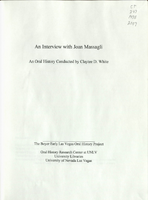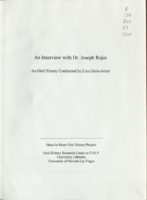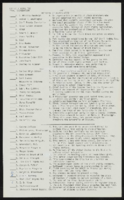Search the Special Collections and Archives Portal
Search Results

Sandra Candel oral history interview: transcript
Date
Archival Collection
Description
Oral history interview with Sandra Candel conducted by Elsa Lopez, Monserrath Hernández, and Barbara Tabach on October 03, 2019 for the Latinx Voices of Southern Nevada Oral History Project. Sandra Candel talks of her childhood growing up with her grandparents in Guadalajara, Jalisco after her mother immigrated to America. She moved to California to attend university before moving to Salt Lake City, Utah, where she raised her children and began homeschooling them. This path led to Sandra opening a Montessori school, igniting her interest in education. She talks of her pursuit of both a Masters Degree from Drexel University and a Doctoral Degree from the University of Nevada, Las Vegas (UNLV). Sandra concludes her interview with discussion of her research and current employment as a part-time instructor for the Department of Interdisciplinary, Gender, and Ethnic Studies at UNLV. Subjects discussed include: Guadalajara; Salt Lake City, Utah; Sensitive Teaching Practices; Multi-generational families.
Text

Anita Tijerina Revilla oral history interview: transcript
Date
Archival Collection
Description
Oral history interview with Anita Tijerina Revilla conducted by Marcela Rodriguez-Campo on October 09, 2018 for the Latinx Voices of Southern Nevada Oral History Project. In this interview, Revilla discusses her early life in San Antonio, Texas. She talks about her decision to make education a priority, figuring out the college application process on her own, and her initial interest in social justice. Revilla talks about how her critical consciousness was developed, and her pedagogical approach to teaching. Revilla describes her role in the 2006 May Day march, advocating advocating for the queer community, and disrupting oppressive systems to increase educational access for students. Lastly, Revilla discusses ethnic studies and the history of inequality in the United States.
Text

Transcript of interview with Joan Massagli by Claytee White, August 19, 2010
Date
Archival Collection
Description
Joan Massagli spent her childhood in the Tacoma, Washington area, singing three-part harmony—a member of a musically talented family that included five children and an aunt and uncle who raised all the kids to enjoy music. By high school in the early 1950s, she and her two older sisters were regulars on a local TV show. In 1956, the Sawyer Sisters act was formed and they were soon obtaining regular gigs in Las Vegas. Their popularity continued form 1957 to 1964 and they played many of the major hotels, usually as a warm up act for headliners that includes a list of names such as Roy Clark, Louis Prima, Shecky Greene, and Delia Reece. At first the Sawyer Sisters included older sister Nanette Susan and Joan. When Nanette quit to raise her family, youngest sister Kate stepped into what was called a "lively and lovely" trio. Joan met her future husband and musician Mark Tully Massagli, while performing in the early 1960s. Caring for ailing parents while working mostly in Las Vegas, the couple made Vegas home. Even after the Sawyer Sisters name faded from the Strip's marquees, Las Vegas remained home to the Massagli's, who raised their children here. Today they live in the Blue Diamond Village area and recall the changes that have occurred on the Las Vegas Strip—especially from an entertainer's point of view.
Text

Transcript of interview with Dr. Joseph Rojas by Lisa Gioia-Acres, September 30, 2008
Date
Archival Collection
Description
Dr. Joseph Rojas, born 1933 in Alexandria, Louisiana, was the son of Joseph Edward Rojas and wife Carroll. He graduated high school at age 16 and entered Loyola University of the South. Two years later he was accepted at Louisiana State University School of Medicine, graduating with a medical degree in 1957. He interned at Charity Hospital and then completed his OB-GYN residency at Tulane University. Several mentors worked with Dr. Rojas during his residency and he recalls learning surgical and bed-side skills from the likes of Dr. Lynn White and Dr. Fred Janson. He also remembers the very high volume of patients - up to 300 - that he and other residents saw daily. Dr. Rojas married Mona Robicheaux, RN, during his residency and afterwards joined the Air Force. He and his family — they eventually had six children — were stationed at Nellis Air Force Base, arriving in Las Vegas in 1961. He was chief of OBGYN and deputy hospital commander while at Nellis and then served as chief of OBGYN at Southern Nevada Memorial Hospital until 1972. He later served as chief of staff at Women's Hospital and Valley Hospital, and was the first chief of staff at Summerlin Hospital. Dr. Rojas also maintained a private practice outside of the hospital. His wife worked alongside him in his office, and they share memories and anecdotes of the patients they saw and the general atmosphere of the medical community. Both Joseph and Mona agree that Las Vegas hospitals were less racially segregated than the hospitals in Louisiana, and felt that the West was more open to integration. In 1966 Dr. Rojas started the first OB-GYN residency in Nevada, which led to the development of the University of Nevada School of Medicine. He was a researcher, lecturer, teacher, and author. He earned many awards, including the Harold Feikes MD Award for Outstanding Physician in Clark County (2001), and the Nevada State Medical Association Distinguished Physician Award (1980). Dr. Rojas passed away in May of 2009, leaving behind an incredible legacy of service to the residents of Clark County.
Text

Jessica Hutchings oral history interview: transcript
Date
Archival Collection
Description
Oral history interview with Jessica Hutchings conducted by Barbara Tabach on March 21, 2018 for the Remembering 1 October Oral History Project. In this interview, Jessica Hutchings discusses her experience flying to Las Vegas, Nevada on the night of the October 1, 2017 mass shooting. She speaks of her flight's detour to Phoenix, Arizona, and her discovery of the shooting. Hutchings explains how Congregation Ner Tamid, where she is a cantor, contributed to the community healing after the tragedy, including their organization of vigils, a music fundraiser called "Vegas Strong in Song," and discussing the event with teenage Hebrew School students who had questions and concerns about the shooting.
Text

Alpha Kappa Alpha Sorority, Theta Theta Omega Chapter meeting minutes (redacted)
Date
Archival Collection
Description
From the Alpha Kappa Alpha Sorority, Incorporated, Theta Theta Omega Chapter Records (MS-01014) -- Chapter records file.
Text

Margarita Rebollal oral history interview: transcript
Date
Archival Collection
Description
Oral history interview with Margarita Rebollal conducted by Marcela Rodriguez-Campo and Barbara Tabach on February 28, 2019 for the Latinx Voices of Southern Nevada Oral History Project. Margarita Rebollal is a lifelong community organizer and advocate for Latinx civic engagement and rights. She shares what it was like to grow up in Ponce, Puerto Rico and shares her childhood memories growing up on the island with her siblings. Rebollal also discusses the death of her father and the eventual move of her family to New York City, New York. She also recalls her education and teen years. Later, she would move to California, and eventually find her way to Las Vegas, Nevada in 1996. Rebollal discusses her passion for civic engagement and the many years serving the community, being most well-known for her role in founding the Puerto Rican Association of Las Vegas and the Hispanic International Day Parade of Nevada. Rebollal also discusses her campaign for the Ward 1 Las Vegas City Council seat.
Text

Nancy Brune oral history interview: transcript
Date
Archival Collection
Description
Oral history interview with Nancy Brune conducted by Monserrath Hernandez and Rodrigo Vazquez on August 21, 2019 for the Latinx Voices of Southern Nevada Oral History Project. In this interview, Brune recalls her childhood and her experiences growing up in Austin and San Antonio, Texas to a Mexican-American father and British mother. She often identifies herself as tejana. Brune has lived in Las Vegas, Nevada since 2007 and is the Executive Director of the Kenny Guinn Center for Policy Priorities. Brune is a graduate of Harvard and has a doctoral degree from Yale University. She and her husband, Richard Boulware, who is a born and raised Las Vegan, have three children.
Text

UNLV Ethnic Studies 102 final exam (blank) and Ethnic Studies (ETS 480X) "Seminar in Race Awareness: Minority Groups and Media" assigned readings
Date
Archival Collection
Description
From the Roosevelt Fitzgerald Professional Papers (MS-01082) -- Personal and professional papers file.
Text

Lynnette Sawyer oral history interview: transcript
Date
Archival Collection
Description
Oral history interview with Lynnette Sawyer conducted by Nathalie Martinez on January 03, 2019 for the Latinx Voices of Southern Nevada Oral History Project. Barbara Tabach and Laurents Bañuelos-Benitez also participate in the questioning. Lynnette Sawyer identifies as a Puerto Rican woman born and raised in Spanish Harlem in New York. Her ancestry extends from Spain to Africa and has helped her identity, as she became an educator and museum curator. She describes her life in New York and her journey to Las Vegas. As the founder of the Hispanic Museum of Nevada, she wanted to create a space that would teach young Latinos about their history and heritage.
Text
